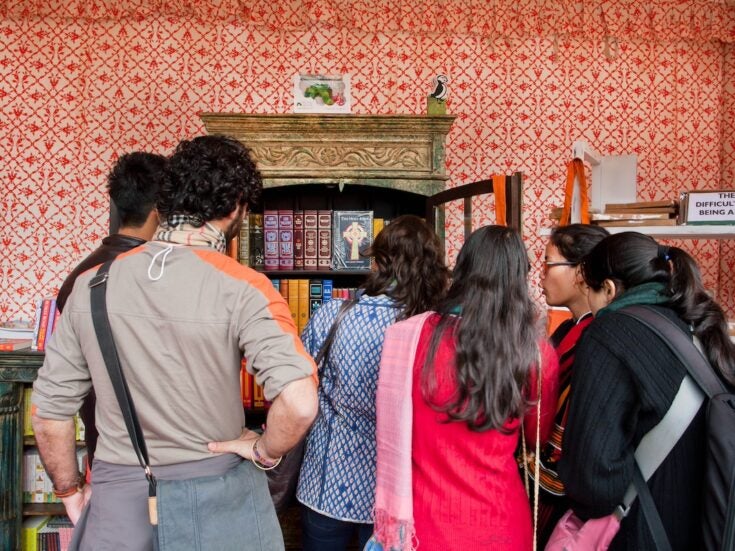The sheer abundance of stuff in today’s supermarkets makes you long for simpler times when less really was more, says Clive Aslet.
The other day I went to a supermarket. That’s nothing very special: we all have to go to supermarkets from time to time, however much we’d like to avoid doing so. But on this visit, I was in a hurry. After a long drive, I had delivered wife and family to my mother-in-law’s house, too late for lunch but too early for tea. I needed to get something to fill the gap, quick.
But as I rushed from aisle to aisle, assembling the ingredients of a wholesome, yet child-acceptable picnic, I realised that quick isn’t something supermarkets do any more. The Cambridge Waitrose is not a large store, but it does insist on giving you choice. Not one kind of tinned tomatoes but about 10. Miles of shelf, acres of floor area — you really need a golf buggy to get round it, and an astrophysics degree to analyse the difference between the offerings. Choices, choices — except, on this occasion, in the matter of sandwiches, which were almost sold out.
And then, as I nosed the car around a black tableland of carpark in search of the exit, I began to ponder the phenomenon. To my parents’ generation, it was axiomatic that choice was good. They had known food rationing after World War II. The lean years were followed, on the Biblical principle, by fat years: a never-had-it-so-good time for British farming, when the government paid farmers to intensify, ripping out hedgerows and heaping cheap food onto the nation’s dinner table. It was the golden age of the Sunday roast, as families — not so dysfunctional then, or prone to graze — gathered around a succulent joint of meat.
Oh, what good, solid British fare it was! Plain meat — no need to disguise such fine cuts of meat with filthy foreign sauces, I would be told — vegetables boiled to the point of disintegration, the whole providing the brightest accent in a food landscape so restricted in palette that even educated diners would have been puzzled to say whether mozzarella was a painter, a wine or a disease.
Of course, the generation that grew up on such a diet welcomed the supermarket: unblemished vegetables, ready meals, salad in bags, Belgian chocolates, choice, choice, choice. As a child, I knew olive oil only as Popeye’s consort — my mother viewed it as a dangerously exotic substance, to be used in no more than homeopathic doses, if at all. Now a martyr’s paradise of extra virgins is on offer at any supermarket worth its Maldon sea salt.
I know that complaining about choice is like objecting to hot days in summer — make the most of them, boy, while they last. But it’s not only that I can’t find the hummus. I sense we may be approaching one of those predictive moments, rather like the last days of the property boom.
When supermarkets encourage shoppers to pile their trolleys high with such a profusion of produce from around the world, a third of which, we’re told, will go mouldy at the back of the fridge, one can’t help wondering if such a ‘rash fierce blaze of riot’ isn’t doomed. As Shakespeare’s John of Gaunt proclaimed, ‘With eager feeding food doth choke the feeder.’ As a society, we have stuffed ourselves to the point of obesity on all the food choices that are available. We have stopped thinking about where it comes from — or if it will come at all.
The picture looks rather different in Haiti, Mexico or West Bengal. There have been riots over food in those places in the past year. For them, food had simply become too expensive to buy. Rich countries may think that these are Third World problems, something for the Overseas Development Minister to sort out. So grain prices are high? We’ve got the money to outbid poorer nations. That’s why there haven’t been riots at the Tesco checkout, just moans as the credit card is handed over. But as the world population heads towards nine billion, what happens when the shortages get worse?
We ought to know the answer already. The first thing that most grain and rice exporting countries did this year was to stop selling. They slapped on export restrictions to keep their food for themselves. And you can’t buy what’s not for sale.
Supermarkets call the system by which they keep their shelves full Just In Time. A new consignment of, for example, kumquats arrives just as the last kumquat of the old batch is being sold. This obviates the need for stock to be kept on the premises. Suppliers deliver to the distribution centres on the same principle. It is highly efficient.
But JIT has got the jitters. An absence of kumquats might not be a disaster, but one wouldn’t say the same about bread. Food security, laughed to scorn by farmer-hating Labour politicians only a few years ago, is now back on the agenda. The public will have to learn to love farmers. That will be a turn up for the books.
The other day I met a former investment banker who had made such a bundle of money that he could leave Canary Wharf and set up as a full-time farmer himself. He foresaw what he described as re-ruralisation: people will want to live in the country because that is where food comes from.
Those who can’t do that will study the way local food is grown in Havana. When the Iron Curtain fell and Moscow’s subsidies dried up, Castro ordered a kind of Dig for Victory which saw every public and private space in Havana planted with vegetables. The result may not have been very victorious: the buyers at Sainsbury’s would be appalled by the limited choice. But the model is being taken seriously by some surprisingly eminent politicians, planners and food gurus who think that we must find other ways of feeding ourselves. Food lessons from Cuba? It’s a funny old world.







